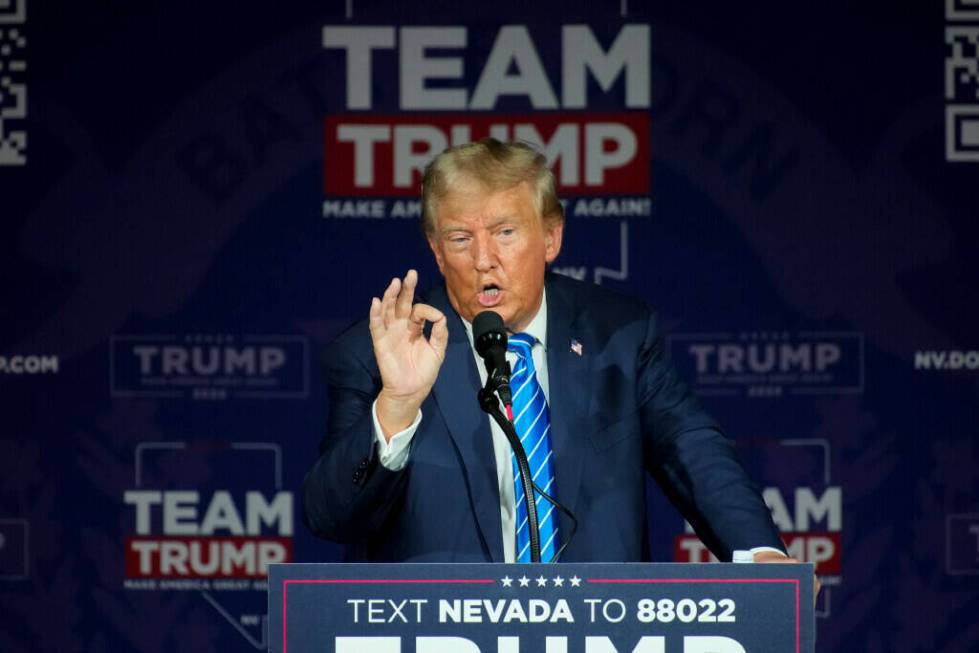Colorado banned Trump from ballot. Is Nevada next?

Colorado barred former President Donald Trump from the 2024 primary ballot, with its Supreme Court determining Tuesday that he is ineligible to be in office under the U.S. Constitution’s insurrection clause.
Similar lawsuits have been filed across the country, but a similar court decision likely will not come in Nevada — at least not for a while.
First and foremost, Trump is not participating in the Nevada primary in February; rather, he opted to join the Nevada Republican Party’s caucus on Feb. 8.
Demands to remove Trump from the Nevada ballot are moot, although if he wins the Republican nomination, those requests could receive a renewed push ahead of November. Future litigation, however, is predicated upon potential action from the U.S. Supreme Court.
Trump’s legal team has said it will appeal the Colorado decision to the U.S. Supreme Court. The issue must be settled by Jan. 5, the deadline for the state to print its presidential primary ballots, according to The Associated Press.
The Colorado decision marks the first time in history that Section 3 of the 14th Amendment has been used to disqualify a presidential candidate. The Insurrectionist Disqualification Clause — created following the Civil War to prevent former Confederate soldiers from returning to office — disqualifies any individual who has taken an oath to uphold the U.S. Constitution and then engages in insurrection or rebellion against the United States.
Before the Colorado Supreme Court overturned the decision, a district judge in Colorado found that Trump incited an insurrection with his role in the Jan. 6, 2021, attack on the Capitol, but the judge also said Trump could not be barred from the ballot because it was unclear if the provision applied to the presidency.
Whether the U.S. Supreme Court agrees, its decision will pave the way for decisions in other states.
For now, Nevada gets to avoid the issue in the primary and let things play out, said Derek Muller, a law professor at the University of Notre Dame who has closely followed the cases. If Trump becomes the Republican nominee and appears on the general election ballot, “by then, hopefully the Supreme Court has weighed in and solved all these issues,” he said.
Right of parties to choose nominees
The case brings up questions of what a presidential election really is, Muller said.
“It really is a party-run event to choose delegates for the nominating convention,” he said.
Primaries and caucuses are different, and election administration varies from state to state, Muller said. The Supreme Court says a state can come up with rules for presidential primaries, but a state party is free to ignore the rules, and a national party is free to ignore what happens in a state, he said.
The Nevada Republican Party echoed similar ideas in a statement released Wednesday, arguing that the Colorado Supreme Court decision raises concerns about the “fundamental right of political parties to choose their nominees.”
Nevada lawsuit
Similar lawsuits to that of Colorado’s were filed across the country in an effort to keep Trump from the ballot, and Nevada is no different.
John Castro, a Republican presidential candidate who lives in Texas, filed a lawsuit in Nevada based on the insurrection clause while also arguing that Trump’s participation in the primary would cause him harm, as Trump would siphon away votes and fundraising from him.
With Trump not participating in the primary, his lawyers argued that the complaint is moot. Castro’s lawsuits in other states have not had much success. A judge has not given a final ruling on the Nevada case yet, however, others have weighed in on its merits.
Last week interested parties joined the conversation, filing a motion for leave to provide their own arguments. In the motion, former longtime Democratic legislator Chris Giunchigliani and two Republicans in Nye County urged the court to dismiss the complaint for lack of standing and for insufficient service of process.
They want the question of Trump’s eligibility to be answered under the Constitution, but they believe Castro’s route is not the way to get those answers.
Contact Jessica Hill at jehill@reviewjournal.com. Follow @jess_hillyeah on X.